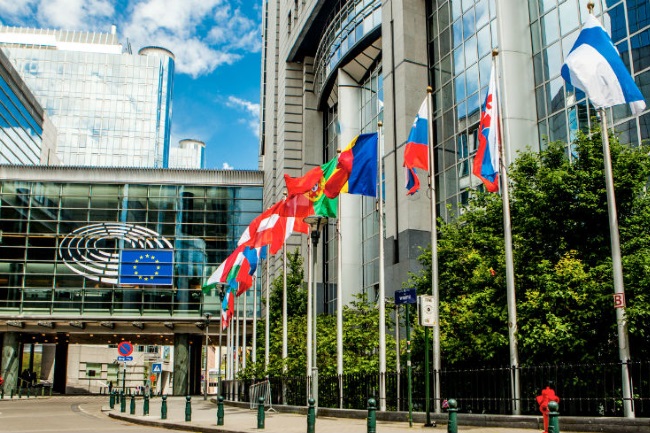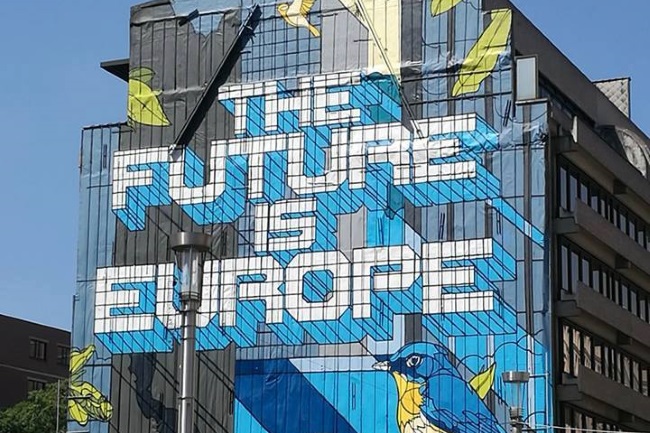In our latest European politics article Catherine Feore muses on The Future of Europe.
If you’ve wandered down rue de la Loi, you can’t miss the giant ‘The Future is Europe’ mural; apart from all else, it is a bright point on what is a fairly dreary four-lane motorway that is largely populated with glass-fronted European Commission offices.
Funded not by the European Union, but by an entrepreneur and executed by a local artist NovaDead, it was a defiant and optimistic assertion, one that was very welcome in 2017, coming after the Brexit vote and the election of Donald Trump. Like most advertising slogans, if you stop to think about what it means it seems a little overblown and asks as many questions as it answers. A bit like Nike’s tagline ‘Just do it’. Just do what exactly? Place your hand in a bucket of boiling water? Jump off a cliff?
Is there a new impetus for change?
‘Conference on the Future of Europe is open for business!’
Launched in April, the Conference on the Future of Europe opened with a new multilingual digital platform. If there were ever two words to make my heart sink, it would be ‘digital’ and ‘platform’. CoFoE, as it is known, has the aim to engage, to be grassroots driven, to inspire a new generation – all worthy, but we are told that no treaty change will emerge from it, member states have already ruled this out. Never has a future been so under-promised, so maybe with a bar set this low it could only over deliver.
The CoFoE had its inaugural plenary on 16 June, but what will this seemingly amorphous blob be? The plenary will be composed of the European Parliament, Council and Commission, the Committee of the Regions, the Economic and Social Committee, social partners (business and unions), civil society and citizens. They will have discussions around themes and then there will be recommendations. That’s pretty much it, in a nutshell.
I apologize for not being more enthusiastic about CoFoE – and I write this as a die-hard believer in the European project – but is this anything more than a distraction? I am not immune to the EU’s flaws and occasionally heave a deep sigh when I feel that it has failed to live up to its potential or responsibilities. Overall, my own view is that the EU is a force for good, but it is also the sum of its parts and sometimes holds seemingly irreconcilable positions. Most citizens would acknowledge that corporate tax reform, for example, is in need of profound reform and needs a European – if not global – approach, and yet any single member state can still block reforms. We find that some EU action has to take a rather tortured route to be compatible with the current treaties, and it often requires cajoling and concentrated persuasion. But the EU is a union of consent, and as Churchill once said “to jaw-jaw is better than to war-war”.
Many of those involved in the conference – the Parliament, Committee of the Regions and Economic and Social Committee were put in place to strengthen Europe’s connection with the European citizen and civil society. Had they been successful we wouldn’t need a CoFoE. There have been so many attempts to somehow acquire more engagement and with it support for the European project: the European Citizens’ Initiative, the Spitzenkandidat process, attempts to get support for trans-national party lists in European elections, inter-parliamentary weeks to strengthen co-operation between national parliaments and the European Parliament, the heads of government presenting their visions for the Future of Europe…

President of the European Peoples’ Party in the European Parliament Manfred Weber said at a recent Bruegel debate on the conference that he sees it as a listening project, and he would like to see it continue beyond next spring and the French presidential elections. He also says that what Europe needs – and what it is currently lacking – is leadership, giving the example of Kohl and Mitterand, who made great strides forward in the 90s.
Europe has been framed by its past. It was a bit of a running joke when Neil Kinnock was a commissioner that he would begin every speech he ever delivered in Brussels with the words: “Who would have thought in 1945…” He was of course right, the European Union and nearly eighty years of peace is no trifle; while the Nobel Prize committee may have been premature in awarding a peace prize to a newly elected President of the United States, the awarding of the Nobel to the EU in 2012 for advancing the causes of peace, reconciliation, democracy and human rights in Europe was long overdue.
It is no accident that those ardent Europeans Kohl and Mitterand that Weber cites experienced the Second World War and the horrors it brought, but while not forgetting the lessons from its past, Europe needs to build a future that is relevant for a new generation.
The financial crisis and the decade that followed threw Europe into one of the most difficult decades it has experienced since its inception. It has been a decade that has been particularly hard on Europe’s young. The EU has put forward a programme to tackle major challenges such as the European New Green Deal, the emphasis on the digital age and NextGenerationEU, which puts significant resources behind its objectives. Listening to the public on their expectations for Europe’s future is very important, but delivering results will probably be more vital to Europe’s future – these objectives are not exclusive to each other, but rather than pondering on ‘the future is Europe’, we should ‘Just do It!’







